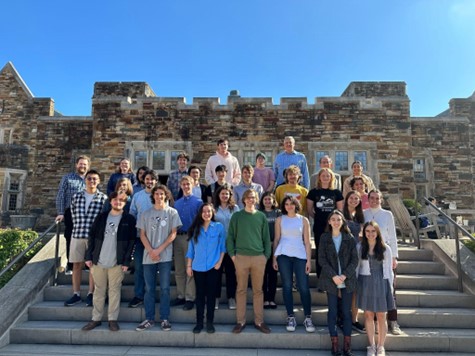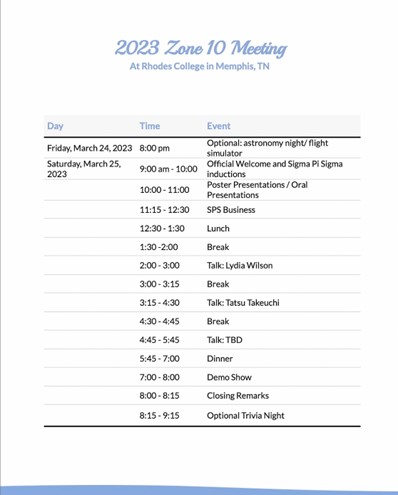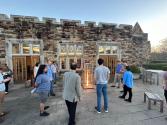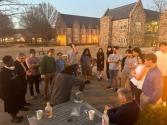SPS Zone Meeting
March 24, 2023 to March 25, 2023
Memphis, TN
Meeting host: By:Jessica Hamer
SPS Chapter:

Agenda
List of chapters that attended
- Rhodes College
- The University of Southern Mississippi
- The University of Mississippi
Number of attendees
32 attendees
Recommendations for future zone meeting planning
Overall, the event went smoothly, but our planning committee wished that the Zone
Councilor had been more involved. We had a really hard time getting people outside of Rhodes College to attend, and a lot of that was due to not being able to contact department heads effectively. More involvement from the ZC would have helped attendance rates and possibly the quality of the meeting overall, as no one on the planning committee had any experience planning a conference like this.
Narrative
The planning of the zone meeting took place over about 5 months, from November 2022 to March 2023, with the bulk of the planning happening in February and March. The first thing done was securing our headline speaker, Dr Tatsu Takeuchi. Dr Takeuchi is the author of An Illustrated Guide to Relativity, an introductory special relativity textbook, and a Professor of Physics at Virginia Tech. He currently serves as the President of the Chesapeake Section of the American Association of Physics Teachers (CSAAPT).
The middle and late stages of planning involved deciding the schedule of the meeting, bringing on other speakers, and encouraging people from other schools to attend. This last step proved incredibly difficult. For about 2 months straight, we sent emails asking for RSVPs from every registered school in the Zone. However, only two schools RSVPed at all, both in the affirmative, about 2 weeks before the meeting. No other school RSVPed. The University of Mississippi’s SPS chapter was very helpful in offering to pool their resources. They brought an interesting demo and offered to help print posters, if need be. They also offered one of their professors as a speaker, Dr Breese Quinn.
In addition to Drs Takeuchi and Quinn, Dr Lydia Wilson agreed to speak at the meeting. Dr. Wilson is a medical physics faculty member in the Department of Radiation Oncology at St. Jude Children’s Research Hospital, where she divides her time between clinical and research duties. Lydia’s research aims to improve our understanding of the relationship between physical radiation exposures and their biological effects in the pursuit of improved long-term health outcomes for the survivors of childhood cancer. She is active in the American Association of Physicists in Medicine as co-chair of the Task Group for Mentorship Activities, Radiation Research Society as chair of the Scholars in Training Committee, and International Society of Radiation Epidemiology and Dosimetry as co-chair of the Early Career Investigator Support Working Group.
The meeting was set to begin with optional activities the evening of Friday, March 24th, including observing with the on-campus telescope and a flight sim. However, due to harsh weather, including multiple tornados, these events were canceled. Saturday morning, the meeting was officially opened by Nolan Brown, VP of Rhodes College SPS. Coffee, tea, fruit, and donuts were served. Following a short introduction, Dr. Viano, an Associate Professor of Physics at Rhodes College and past president of Sigma Pi Sigma, inducted multiple new members into Sigma Pi Sigma, including undergraduates and current faculty.
Following the Sigma Pi Sigma inductions, there was an opportunity for presenting research. Two people presented orally, while multiple people presented posters. Following this, the Rhodes SPS Demo Officer and Zone X Associate Zone Councillor Jess Hamer conducted official SPS business. They presented critical information on how SPS National can aid local chapters and how chapters can do more both locally and nationally. In addition, they guided the officers of Rhodes SPS, U Mississippi SPS, and Southern Mississippi SPS in sharing their past years’ achievements and events. The organizations gave each other multiple ideas, including the human Newton's cradle, and vacuum sealing trash bags around people (not over their heads, just around their bodies).
Following this, a much needed lunch was taken at the Catherine Burrow Refectory at Rhodes College. Students and Faculty were given all-you-can-eat meal tickets, and were free to help themselves to brunch and lunch options. A short break was built in after this, and Ryan McCrory, President of the Rhodes Astronomy Club, took the opportunity to set up multiple smaller telescopes equipped with solar filters. People were permitted to view the sun at their leisure.
After the lunch break, the colloquia began with Dr Wilson. Dr Wilson spoke on both her research and clinical work, as well as on a topic dear to many undergraduates, figuring out what to do in life. Dr Wilson’s path to medical physics was not a linear one, as she is the first to admit, and this experience is helpful in constructing a talk geared at uncertain undergraduates. She describes strategies of self-discovery she used to figure out what motivated her. Above all, she recommends trying new things and being open to experience. She also discussed how she uses radiation to treat cancer, and how she attempts to use physics to prevent that same radiation from harming her patients.
Following Dr Wilson’s talk, Dr Takeuchi spoke on Newton’s Laws. He argued that the way Newton’s Laws are currently taught is misleading and unhelpful, and that they can be better understood as a statement of conservation of momentum. So, a force is simply a change in momentum, while the 3rd law states that if any body gains momentum, the giving body must lose that same momentum. This concept sparked a heated debate between Dr Takeuchi and other present faculty, who took major issue with his dismissal of quantum springs in the relevance of statements like “this wall pushes back”. After about 15 minutes of high intensity academic discussion, the time for questions was over, and we had to move on.
Following Dr Tackeuchi’s talk, Dr Breese Quinn spoke about the particle physics research done at Ole Miss. He spoke about the history of neutrinos and how to detect them and explained the next steps in neutrino discovery. He outlined the DUNE experiment and its significance. He also outlined the other particle research going on in the High Energy Physics Group at Ole Miss.
Following Dr Quinn’s talk, a dinner of pizza from local pizzeria, Aldo’s, was served. An attendee who was gluten and dairy free was provided a meal from a more accommodating choice.
After dinner, a demo show was held. Demos included a fire extinguisher powered rocket cart, a tesla coil which can play music, a fire tornado, a laminar flow device, and a coffee creamer flamethrower. This was a favorite portion of the evening for many attendees, students and faculty alike. Following the demo show, the meeting was officially closed.
After the closing of the meeting, an optional trivia event was held, and about half of the attendees participated. A mixture of physics and pop culture trivia questions, answered Quiz Bowl style, proved entertaining.
Areas of Alignment:




